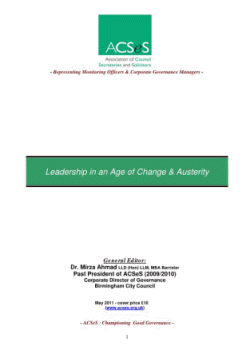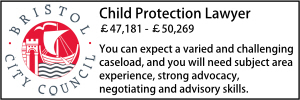How the Bar can help
- Details
Bar Council chairman Peter Lodder QC explains how changes to the Bar's business model can benefit local authorities.
The Bar is proud of a long and rich history, it also recognises the requirements of a modern market place. We are an approachable, market sensitive profession.
Working with barristers is not new for many local authorities. Much of that work will have been undertaken through solicitors, using the referral model. But the Bar has been modernising its structures and working patterns so that it can work more directly with a range of clients, including local authorities. Traditional working relationships will still be available, but the Bar is an evolving and changing profession; and it’s here to help.
In a difficult economic environment, there is a greater need for certainty in legal expenditure. Understandably, clients are looking to get more for their money, and ideally spend less. But as well as that, clients want to get a clearer idea from the outset what a piece of work is likely to cost.
One way of achieving this is through tendering exercises, with volumes of work exchanged for discounted rates. Clients are looking to contract with single entities, which will prove to be reliable and low-risk business partners. This is precisely the direction of travel which the Bar has adopted.
Embracing the future
Last year, my predecessor, Nicholas Green QC, laid out a vision for the future of the Bar. It is an adaptable profession, accessible and quick to react to the market with high quality services at its core and a low-cost base, which will deliver excellent value for money to clients. The Bar is not just a profession for courtroom advocacy. It provides a wide range of written and oral advice, which, if sought at an early stage, can avoid the expense of a lengthy litigation process. The Bar can take instructions directly from clients, without the need for a solicitor, which can also save money.
The range of services available has broadened, to include preparation of witness statements, conducting correspondence and taking evidence. Barristers can meet more of their clients’ needs than ever before. Over the past year, the Bar has been embracing the future. It has been developing new business models to meet the needs of clients (particularly entities) who wish to contract directly with the Bar. The Legal Services Act 2007 lays out a new landscape for the delivery of legal services, including Alternative Business Structures, which come in to force in October this year.
Anticipating the changes introduced by the Act, the Bar’s new business models are intended to help clients to access its services with the minimum of fuss. These one-stop-shops will be able to manage all of the contracting and billing requirements from a low cost base. Barristers have shown a huge appetite for varying
their working practices in order to accommodate new business opportunities.
Ready to engage
The Bar Council, has given careful thought to meeting the needs of a broad client base. We have set up a working group, led by Michael Todd QC, the Vice Chairman of the Bar, to explore how we can work more closely with local authorities of all shapes and sizes. An important aspect of that group’s work will be to facilitate a two-way flow of information to make sure that we understand what local authorities require, as much as telling them what we can do. There has to be a strong fit.
The Bar can offer local authorities a particularly strong value proposition. Its new business models have created a viable way of accessing the Bar’s services directly. There are a number of elements to this offering which will reassure contractors about the levels of quality and risk.
High quality, low risk
As well as the high quality services that the Bar can provide through these single entities, it is also a strictly regulated profession which poses a low insurance risk. We have had an independent regulator, the Bar Standards Board, since 2006. Local authorities can have every confidence that the Bar’s quality and standards are strictly monitored by a strong regulator, working in the public and the consumer interest.
In terms of insurance, the Bar has a longstanding professional indemnity insurer, the Bar Mutual Indemnity Fund (or BMIF). It is mandatory under the Code of Conduct for all barristers to have insurance in place, as  determined by BMIF and strictly enforced by the Bar Standards Board. Local authorities can have confidence that a broad tendering requirement stating that barristers comply with the insurance requirements imposed by the regulator will be robust.
determined by BMIF and strictly enforced by the Bar Standards Board. Local authorities can have confidence that a broad tendering requirement stating that barristers comply with the insurance requirements imposed by the regulator will be robust.
What next?
The Bar Council is ready and willing to advise local authorities on how they might be able to work most effectively with the Bar. We have experience of conducting tendering exercises and many sets of chambers employ Chief Executives, Practice Managers and Business Development personnel with a strong commercial awareness.
We are keen to work more closely with local authorities, understand the value of an open dialogue and would welcome your feedback. Please feel free to contact my office directly, by telephone or by emailing my Executive Assistant, Ariel Ricci:
Peter Lodder QC is Chairman of the Bar Council of England and Wales.
This article first appeared in 'Leadership in an Age of Change & Austerity', published in May 2011 by the Association of Council Secretaries and Solicitors (ACSeS).
To order or download a copy from the ACSeS website, please click here.
Governance Lawyer
Regulatory/Litigation Lawyer
Legal Director - Government and Public Sector
Education Lawyer
Contracts Lawyer
Lawyer (Planning and Regulatory)
Antisocial Behaviour Legal Officer
Locum roles
 When needs trump all: a guide to navigating modest asset cases - 42 Bedford Row
When needs trump all: a guide to navigating modest asset cases - 42 Bedford Row
05-12-2025
Online (live)
 Planning, Property and Power Webinar Series: challenging grid connection decisions - Landmark Chambers
Planning, Property and Power Webinar Series: challenging grid connection decisions - Landmark Chambers
05-12-2025 10:00 am
Online (live)
 HMPL Building Blocks: Law and Procedure Following Death of a Tenant - Devonshires
HMPL Building Blocks: Law and Procedure Following Death of a Tenant - Devonshires
09-12-2025
Online (live)
 Renters’ Rights: Challenges to rent increases in the First-tier Tribunal - Devonshires
Renters’ Rights: Challenges to rent increases in the First-tier Tribunal - Devonshires
11-12-2025 11:00 am
Online (live)
 Masterclass – Mental Health Act – Legal Update - Peter Edwards Law Training
Masterclass – Mental Health Act – Legal Update - Peter Edwards Law Training
17-12-2025
Online (live)
 Masterclass – MCA and Court of Protection - Legal Update - Peter Edwards Law Training
Masterclass – MCA and Court of Protection - Legal Update - Peter Edwards Law Training
21-01-2026
Online (live)
 Managing settlements: the legal and practical issues, and the pitfalls to avoid - Blake Morgan
Managing settlements: the legal and practical issues, and the pitfalls to avoid - Blake Morgan
22-01-2026 10:00 am
Online (live)
 Children and Young People (DoL, Competency and Capacity) - Peter Edwards Law Training
Children and Young People (DoL, Competency and Capacity) - Peter Edwards Law Training
28-01-2026
Online (live)
 HMPL Building Blocks: Legal Tools to Combat Anti-Social Behaviour - Devonshires
HMPL Building Blocks: Legal Tools to Combat Anti-Social Behaviour - Devonshires
17-02-2026
Online (live)
 Freedom of thought, belief and religion: Article 9 ECHR - Francis Taylor Building
Freedom of thought, belief and religion: Article 9 ECHR - Francis Taylor Building
19-02-2026
Online (live)
 Grappling with S73 - variations of conditions applications or appeals - Ivy Legal
Grappling with S73 - variations of conditions applications or appeals - Ivy Legal
09-03-2026
Online (live)
 HMPL Building Blocks: Tenancy Management – Assignment, Mutual Exchange and Succession - Devonshires
HMPL Building Blocks: Tenancy Management – Assignment, Mutual Exchange and Succession - Devonshires
12-03-2026
Online (live)
 Section 31(2A) Senior Courts Act: where have we got to? - Francis Taylor Building
Section 31(2A) Senior Courts Act: where have we got to? - Francis Taylor Building
18-03-2026 1:00 pm
Online (live)
 Save the Date: The Law of Public Rights of Way, Commons and Town or Village Greens Seminar (Hybrid) - Francis Taylor Building
Save the Date: The Law of Public Rights of Way, Commons and Town or Village Greens Seminar (Hybrid) - Francis Taylor Building
25-03-2026
London
 HMPL Building Blocks: A Housing Officer’s Guide to Court Proceedings - Devonshires
HMPL Building Blocks: A Housing Officer’s Guide to Court Proceedings - Devonshires
14-04-2026
Online (live)







































































































 The Employment Rights Bill Conference - Westminster Insight
The Employment Rights Bill Conference - Westminster Insight  First Aid Level 3 - LBL Skills
First Aid Level 3 - LBL Skills  Capsticks Housing Diploma
Capsticks Housing Diploma  Education Law Conference - 3PB
Education Law Conference - 3PB  Annual Planning Seminar 2026 - No.5 Barristers
Annual Planning Seminar 2026 - No.5 Barristers 